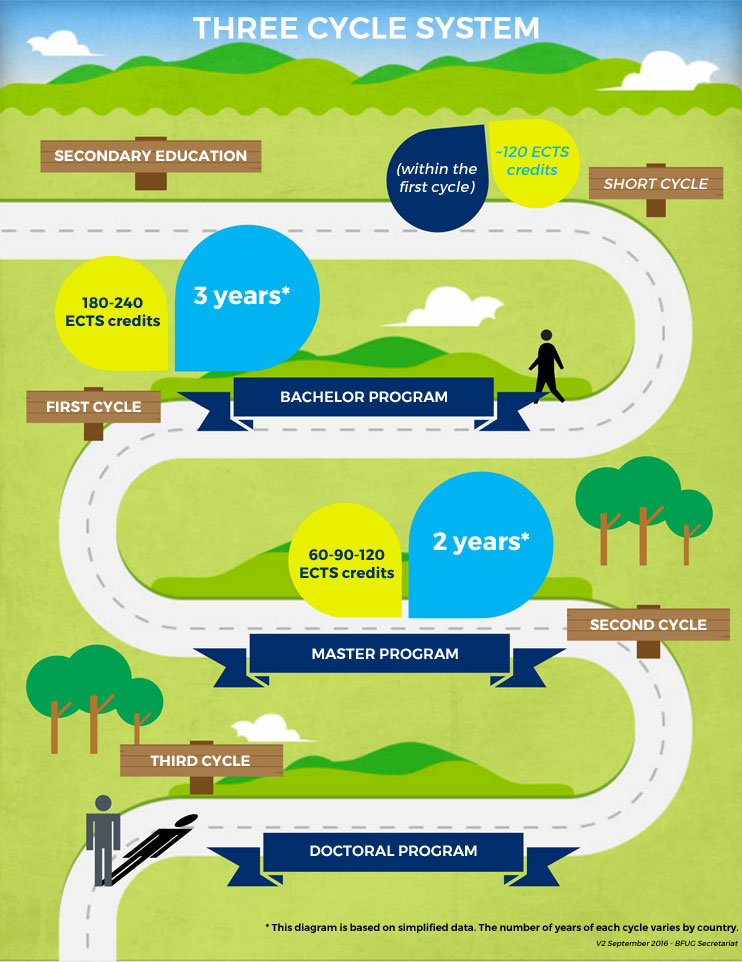- EHEA
- TOPICS
-
Groups
-
Working Group on Monitoring the Implementation of the Bologna Process
-
Working Group on Fundamental Values
-
Working Group on Internationalisation and Mobility
-
Coordination Group on Global Policy Dialogue
-
Task Force on the Future of Bologna
-
Task Force on establishing a long-term Secretariat
-
Advisory Group on ECTS User's Guide Revision
- Bologna Implementation Coordination Group
-
Final Reports 2021-2024
-
2021-2024 working structures
- Working Group on Social Dimension
- Task Force on the Review of the Rules and Regulations...
- Ad Hoc Task Force to Increase Synergies Between the EHEA...
- Task Force on Enhancing Knowledge Sharing in the EHEA community
- Working Group on Learning & Teaching
- EHEA Network of National Correspondents for Qualifications Frameworks
- Working Group on Roadmap for San Marino's accession to the EHEA
-
Working Group on Monitoring the Implementation of the Bologna Process
- EVENTS
-
NEWS
The three-cycle system stands as a foundational pillar of the Bologna Process, aimed at ensuring compatible degree structures for enhanced transparency, recognition, and mobility across the European Higher Education Area (EHEA). This fundamental restructuring emerged from a context where a huge variety of national higher education degrees existed across Europe, leading to increasing problems for recognition as student mobility grew.
This aspiration was promoted in the Bologna Declaration (1999), which formally proposed adopting a system based on "two main cycles, undergraduate and graduate." This was a pivotal first step towards a unified structure, with a central aim to establish a common structure of easily readable and comparable degrees in European higher education. The Prague Communiqué (2001) reaffirmed this commitment to the "two main cycles," emphasizing their flexibility and differentiation. Notably, it also explicitly mentioned "the development of doctoral studies as a third level of higher education".
The definitive establishment of the current three-cycle structure arrived with the Berlin Ministerial Communiqué (2003). It defined that the "first cycle degree," often labeled "Bachelor," is typically obtained after successful completion of a study programme with 180-240 ECTS credits, usually lasting three years, and "should be relevant to the labour market." The "second cycle," commonly labeled "Master," follows with 60-120 ECTS credits. Consequentially, the well known ‘Bologna system’ of degrees took shape, with the length of three years for Bachelor degrees and two years for Master degrees becoming the most common pattern within Europe.
The full formalization of this structure was achieved with the Bergen Communiqué (2005), which formally adopted the "Framework of Qualifications for the European Higher Education Area (QF-EHEA)." This framework explicitly defines the three cycles (Bachelor, Master, Doctorate) through generic descriptors based on learning outcomes for each. As the Communiqué stated, "The EHEA is structured around three cycles, where each level has the function of preparing the student for the labour market, for further competence building and for active citizenship." Therefore, European and national qualifications frameworks are based on the European Credit Transfer and Accumulations System (ECTS) in terms of both quality (learning outcomes) and quantity (workload).
A number of countries offer short cycle programmes which are practice-oriented and provide students with professional knowledge, skills and competences to facilitate entering the labour market. In some countries these programmes may lead to a Bachelor programme, while in others they may be part of it. In yet some other countries this type of programme does not belong to higher education at all. Since the 2018 Paris Communiqué, however, short-cycle higher education qualifications were included as stand-alone qualifications within the QF-EHEA. Each country can decide whether and how to integrate short cycle qualifications within its own national framework (NQF).
The subsequent London Communiqué (2007) focused on the challenges of refining boundaries and promoting flexibility within and between these cycles, particularly concerning doctoral studies. Further refinement and a stronger emphasis on student-centred approaches within these cycles were key themes in the Leuven/Louvain-la-Neuve Communiqué (2009). This communiqué underscored the importance of flexible learning pathways and strengthening doctoral studies as the third cycle, including their intrinsic links to research and innovation.
Particular attendion was given to the Doctoral studies, in which case no credit range was determined. Within EHEA, the third cycle encompasses a broad variety of doctoral phases, ranging from pure doctoral study programmes to fully independent research. These diverse models have various implications for the structure of doctoral studies and the status of the doctoral student (only student or also an employee or researcher). Particularly in countries and/or disciplines where traditionally free individual research dominates the doctoral phase, individuals carrying out these projects are often regarded not as students but as early stage researchers/young professionals. While the core element of doctoral studies in almost all disciplines for centuries had been self-contained research including a scientific dissertation, the EHEA saw an emergence of innovative doctoral programmes that respond to societal changes and the challenges of a global labour market.
The three-cycle system's indispensable role in facilitating transition between cycles remained a central tenet in the Yerevan Communiqué (2015). This communiqué stressed the necessity of "appropriate learning outcomes for each cycle" and continually underlined the structure's importance for mobility within and between cycles, while the Paris Communiqué (2018) established the three-degree cycle as a key commitment of EHEA and referenced the increasing use of interdisciplinary research in doctoral studies.

For all three cycles, it is important to remember that the variety of programmes mirrors the diverse higher education landscape in Europe, however, readable and comparable degrees do not necessarily equate to equivalency of learning outcomes for all qualifications at the same level.
